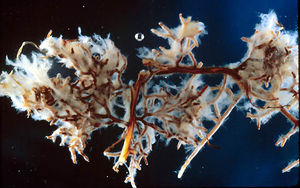Ectomycorrhizal Fungi: Difference between revisions
No edit summary |
No edit summary |
||
| Line 3: | Line 3: | ||
==Structures== | ==Structures== | ||
===Mantle=== | |||
A layer encasing the outside of the root tip in either a loose gathering or tight alignment of hyphae. The presence of the mantle can sometimes hinder root hair growth if the root is secured tightly. | |||
===Hartig net=== | ===Hartig net=== | ||
A network of hyphae strands that work around root cells, as they make their way through the cortex towards the middle of the root. | |||
===Extraradical hyphae=== | ===Extraradical hyphae=== | ||
| Line 19: | Line 20: | ||
==References== | ==References== | ||
[1] Tedersoo, Leho; May, Tom W.; Smith, Matthew E. (2010). "Ectomycorrhizal lifestyle in fungi: global diversity, distribution, and evolution of phylogenetic lineages" (PDF). Mycorrhiza. 20 (4): 217–263. doi:10.1007/s00572-009-0274-x. PMID 20191371. | [1] Tedersoo, Leho; May, Tom W.; Smith, Matthew E. (2010). "Ectomycorrhizal lifestyle in fungi: global diversity, distribution, and evolution of phylogenetic lineages" (PDF). Mycorrhiza. 20 (4): 217–263. doi:10.1007/s00572-009-0274-x. PMID 20191371. | ||
[2] Dighton, J. "Mycorrhizae." Encyclopedia of Microbiology (2009): 153-162. | |||
Revision as of 23:42, 8 May 2018

Ectomycorrhizal (ECM) fungi form symbiotic relationships with plant roots. Only about 2% of the plant species on earth form endomycorrhizal relationships, but therein exist some of the most environmentally and economically important species. [1]
Structures
Mantle
A layer encasing the outside of the root tip in either a loose gathering or tight alignment of hyphae. The presence of the mantle can sometimes hinder root hair growth if the root is secured tightly.
Hartig net
A network of hyphae strands that work around root cells, as they make their way through the cortex towards the middle of the root.
Extraradical hyphae
Fruiting bodies
References
[1] Tedersoo, Leho; May, Tom W.; Smith, Matthew E. (2010). "Ectomycorrhizal lifestyle in fungi: global diversity, distribution, and evolution of phylogenetic lineages" (PDF). Mycorrhiza. 20 (4): 217–263. doi:10.1007/s00572-009-0274-x. PMID 20191371.
[2] Dighton, J. "Mycorrhizae." Encyclopedia of Microbiology (2009): 153-162.